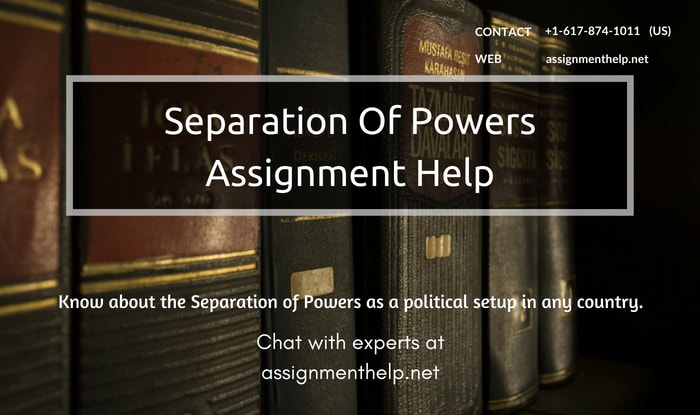Separation Of Powers Assignment Help
At Assignment Help, we study and explain the Separation of Powers as a political setup in any country, under which the Government functions and the legislative powers are divided among mutually independent authorities and constitutional functionaries. Broadly categorized, the 'Doctrine of Separation of Powers' recognizes three essential functions which are The Legislative Functions, The Judicial Functions and The Executive Functions and all other functions are either accessory to, or ancillary to these essential functions.
The duty to discharge the above mentioned functions are entrusted (by the Constitution) to specific bodies which are independent in themselves and do not interfere with the functioning of each other. The power scheme of division of powers is: The Legislative functions are discharged by the Parliament and the state legislature houses. The Judicial Functions are entrusted to the Courts of the country. The Executive functions are entrusted to the local government at the state level or the central government at the national level.

This Assignment provided at Assignment Help will examine the structure of our national government and our system of separated powers with checks and balances. We will examine a variety of cases and disputes concerning separation of powers issues as we do so, we will focus not only on court decisions but also on how officials and lawyers in the Legislative Branch and Executive Branch have handled – and should have handled – those controversies. During the Assignment at Assignment Help, we also will discuss ongoing and current events that illustrate the continuing significance of our three-branch constitutional structure. General topics at Assignment Help will include: the process for electing the Presidents the appointment and removal of executive officers the role of the President in the legislative process, including the veto power the interaction of the three Branches with respect to war and the foreign policy and national security of the United States Presidential power with respect to criminal law enforcement and prosecution the President's authority to issue signing statements and to decline to execute unconstitutional laws the congressional spending authority and power of the purse congressional oversight of the executive branch the scope of executive privileges, particularly with respect to congressional inquiries the roles of the President and the Senate in the appointment of Supreme Court Justices and inferior court judges and the role of the Judiciary in refereeing disputes and power struggles between the Legislative and Executive Branches.
Separation Of Powers Laws Assignment Help Through Online Tutoring and Guided Sessions from AssignmentHelp.Net

Following are some of the topics in Laws in which we provide Law assignments/homework/Project help:
- Administrative Laws
- American Indian Law
- Antitrust Law
- Bankruptcy Laws And Corporate Reorganisations
- Business Law IRAC Analysis
- Capital Punishment Clinic
- Civil liberties Law
- Collaborative law
- Conspiracy, Accessory Doctrine & Enterprise Liability
- Constitutional Law
- Copyright Laws
- Criminal Adjudication
- Criminal Justice Law Assignment
- Criminal Justice Workshop
- Criminology
- Cyber Laws And Cyber Crimes
- Employment Law Clinic
- Employment Law Workshop
- Environment And Environmental Laws
- Family Laws
- Federal Civil Litigation
- Federal Courts And The Federal Systems
- Feminist Legal Theory
- Food And Health Laws
- Government Lawyer
- Insurance Laws
- International Anti-Trust Laws
- International Human Rights
- International Law
- Judicial Process And The Administration Of Laws
- Juvenile Justice And Crimes
- Labor And Factory Related Laws
- Law And Political Process
- Law Assignment Help
- Law Assignment writers
- Law Of Corporations
- Patent Laws
- Securities Regulation Laws
- Separation Of Powers
- State Constitutional Laws
- The Capital Market Laws
- The Corporate Finance Law
- Theory And Practice Of Social Change
- The Real State Law
- Tort Law
- Business Administration Laws
- Business Law
- Commercial and Resources Law
